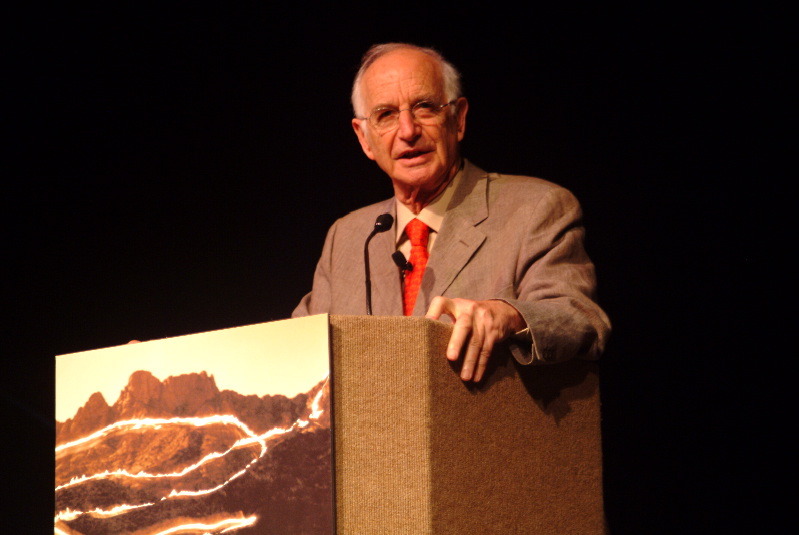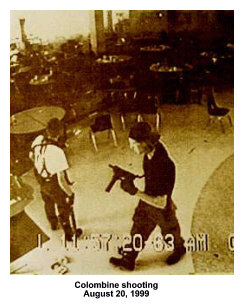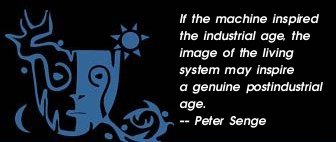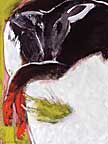|

Produced by Dahna Barnett
Engineered by Brad Barnett and Creative Digital Group
Theme music (Tallman Dub) by Geoffrey Armes

James Hillman: War, Peace and the American Imagination
22830 KBM
"There are more wars in recorded history than there are years in recorded history."
--James Hillman
War, Peace and the American Imagination
Deepak Chopra, author of Peace Is The Way, believes it is possible for individuals to transform their consciousness to such an extent as to
bring war to an end. James Hillman, author of A Terrible Love of War, believes that we are ceaselessly driven to war by psychological realities
that reveal themselves in a multitude of ways. Perhaps we can tame this drive, but can it ever be transformed?
On September 20, 2006,in Glenn Memorial Auditorium at Emory University these great minds discussed and debated the causes of war, examined
the possibilities of peace, and explored the role of the imagination during an evening's conversation moderated by renowned philosopher
and mythologist Jean Houston.
In thinking about this program, I ask myself why I am here. And I think I am here for a different reason this evening than I thought about when I was thinking about it before. (Laughter) These last days, this last three weeks, I'm here because of the American Imagination. I'm here less because of war and peace I think, but because of this enormous, tragic, horror which is the American imagination. The lack of it. The failure of it. The absence of it. And that really is a kind of esthetic numbing in the country. And that is what really brings me and what really moves me.

If we don't imagine, we get Iraq. We get New Orleans. We get criminal irresponsibility. McNamara says 'the failure of imagination.' McNamara, The Fog of War, who ran the defense department under Kennedy and then under Johnson, the Vietnam War: "We can now understand these catastrophes for what they were. Essentially the products of a failure of imagination."
Donald Rumsfeld, talking about surprise and its consequence said, "It is due to the poverty of expectations-the failure of imagination." And the director of the National Security Agency, Michael Hayden, said about the twin towers, "Perhaps it was more a failure of imagination this time than last." Meaning Pearl Harbor.
The failure of imagination. What is wrong with us? What is this failure of imagination? Keegan, one of the great writers on war, said that one of the essential aspects of war is deliberate cruelty. Deliberate cruelty, not accidental cruelty-not the cruelty of near misses and so on-but deliberate cruelty. And it is this that we get when we plan and we don't imagine.
We know how to plan. We had plans for New Orleans. Excellent plans. But we didn't have an imagination of what could happen. This is a very important thing because where does imagination go to school in the United States? Where is our esthetic, artistic, fantastic, speculative possibility? That's what's missing.
We know how to plan. We can plan a ten thousand carpet bomb. We can use the big, conceptual words like evacuation. We can talk about the bridge. But we can't imagine what goes on in the hearts of the victims. Or what goes on in the hearts of the actual people.
For example, since New Orleans is in everyone's mind, people are told to evacuate-mandatory evacuation-but does anyone imagine that you may not have the money for the gas? Or to have a car? That's imagination, not planning. We are excellent at planning...but can we imagine?
Can we imagine the lasting consequences of war? The wanderings of people. The waste. The wasted lives. The woundings that are carried ever after. And the numbers of psychic damages ever after: each person's life, body, family, neighborhood, carrying the wounds. We are still carrying the wounds of Vietnam, deeply, heavily, implacably.

And something else that we have to understand is that command and control, which is fundamental in our way of thinking-taking charge, command and control-broke down completely in regard to New Orleans. And is clearly not working in Iraq. So one has to think how do we not...how do we reinforce and rebuild command and control...but how do we re-imagine what this is? And why it doesn't work? What fails in regard to the human heart in regard to that?
Now, by going to war-which is what I think we have to do, we who are here partly because of the word 'peace' in the title of this event-that is, we are doves in heart, we do want peace, but we are the ones who must turn to war and give it deep thought. Because if we don't, we leave war to the hawks. To the war colleges. To the war planners. We leave it to Kristal and Wolfowitz and company. We leave it to the warmongers if those who are dedicated to peace, and long for peace, don't put their minds into the depth of the importance of war.
We have to remember now that Kant, Immanuel Kant the philosopher, said that war is..."the natural state of human beings is war." The French philosopher Levinas said, "Being reveals itself as war." Perhaps he was going back to Heraclites at the beginning of Western thought who said, "War is the father of all things."
In other words, these are very profound thinkers who have said that war is the first question...war is the first question. To think ourselves into its truth. Into its reality. And if we don't do this kind of thinking, we can only oppose war-or work our way through war-by going to war.
We have to go to war in mind. And that's the painful part of it. So that you yourself, by feeling it and imagining it, are hurt by it. Not simply as a witness on TV shows, but realize the implacable, eternal, archetypal force of it that comes...that there are more wars in recorded history than there are years in recorded history. The numbers of wars-the fact that wars have been with us since the beginning of time and continue to be with us all through this century. Even now as we are sitting here, there are I don't know how many wars there are going on in different parts of the world.

So as I am saying, the American imagination is interested in planning, command and control, and fact-finding. Think of Columbine, think of the school in Colorado. What happened with Columbine? They sealed the place off. They removed the bullet holes. The study of Columbine was how soon could we get there-how much sooner could the cops get there? Why did this happen? How many bullets holes were there in the walls? They were all counted. All the facts were gathered. But the imagination of what was going on in the hearts of those boys, where's that?
Sartre said, "He who begins with facts will never arrive at essences." It's that. It's getting to the essence of the issues. The facts don't take us to the essences. We gather the facts. We have fact-finding commissions after every event. But do we imagine?
And then the imagination continues underground as conspiracy theories. The Kennedy assassination was dealt with in fact-finding in the Warren Report. Every bloody possibility of how the bullets entered and came out and went through another head and so on have been registered and recorded. We have all the facts. But it does nothing to the imagination, which continues and continues and continues in conspiracy theories.
So my plea is for imagining. Now how do we imagine? And what is imagining? It isn't simple the way I understand it; it's entering into the heart of the Other. It is an activity in Islamic mysticism. It is an activity of the heart. The heart imagines. Now that isn't simply 'feeling' into the Other, as we learn in psychotherapy: empathy or sympathy and so on, or kibbutz. It's even something other than compassion, because it has not so much to do with the feeling, as it has to do with imagining into the Other.
Can we imagine into the Other? Imagine the enemy? Imagine what he and she and they are living and thinking and believing?
If we think of Iraq then we have to think: why the insurgency? What is in the heart of the insurgency? And then we would step back and think about where are we in relation to what's in their heart? Not the fear in our heart, but what's in their heart.
And if you think about...put yourself into it...we look at our men exposing themselves to terrible risks in the streets of Baghdad or Fallujah or Nejaf and so on...but imagine how they look if you are an Iraqi. These great guys with their uniforms and their pieces and their equipment and their stuff. There's a kind of aesthetic insult in a culture which has an esthetic way of looking at the world. Something we don't even know about. We don't even know the languages. We have a great shortage of translators. You know all this; this is news. But what I am trying to say is that there are ways of imagining how we appear to them. Not our theories, not our politics, not our ideals, that's not what I mean. Our esthetic presentation, ourselves as we are: what that is to someone else.
We have to think as, let's say, anthropologists on a field trip in order to enter into how we are perceived, seeing ourselves from the other side, that's the kind of imaging that I'm calling for.
And I don't want to talk yet about peace. I think that will come up in our discussion. But I do want to say something about love and the importance of love in war. What we often have forgotten is the fact that we love war. There is love in war among the soldiers, there is love for war: the marching off to war, and there is the love of war itself. War is in love with itself and wants to go on and on and on...continuing...
There is a certain kind of love that belongs to war. It has its own love. It has its own beauty. And there are many examples of the charity, the kindness, the nobility of soul, the sacrifice of one's self for the other. The relation of the buddies to each other-these buddies can be men and women, it's not necessarily only men-and that this kind of emotional sweetness that some say they have never felt at any other moment in their lives except in the midst of battle.
They've also felt fear and horror and misery, yes, I don't deny that, but what we need to remember is that there is a kind of love there that surpasses for some who have been in it, and with it, surpasses all other sorts. I don't want to read passages of that, I have a lot of that in my book called A Terrible Love of War, but it's there. And there is a beauty, a love for the beauty of war that overwhelms people.
As the Allied armada moved toward the North African beaches, Ernie Pyle, one of the great writers of the Second World War, wrote, "Hour after hour I stood at the rail looking at an almost choking sense of beauty, and power enveloped me." A member of Patton's staff in Sicily wrote to his wife "and speaking of wonderful things, the high-water mark and perhaps the most beautiful as well as satisfactory sight I have ever beheld was a flaming enemy bomber spattering itself and its occupants against the side of a mountain. God, it was gorgeous."
That's a sense of beauty that people don't want to accept: that they are thrilled, that they find something superlative, sublime, in the midst of war. So if we don't understand the attraction, if we don't understand the attraction of war, we will go on being innocents. And that's our American addiction: the addiction to innocence. That's our only addiction. It's not drugs and it's not marijuana and so on. It's the addiction to not knowing. Not wanting to know. (Applause)
So we can talk about ending war and having peace, but there is something about the God of War that attracts. Mars was always paired with Venus. Venus is beauty, attraction, seduction, charm, pleasure... And if we don't get to that, if we just stand back and say 'war is horrible, I can't look,' we remain children.
So, there are many kinds of war and there are many kinds of love. And one of the aspects has been said by a French philosopher, Foucault, that "what war offers is a maximum of intensity and a maximum of impossibility at the same time." That is very close to an intense, esthetic, mystical experience.
Maximum of intensity. That's why when they come back, they can't talk about it because they were in another plane, in another state. A maximum of intensity and a maximum of impossibility. Death and love at the same moment. Eros and Thanatos in Freud's language.
And so the battle engagement for some, and often reported by many in different cultures: most sublime, romantic moment. Comparable only to falling in love in the sexual, passionate. In other words, the Venus aspect of the Mars-Venus pair. The mythic imagination that seizes.
Now, the third part that I want to stress is that war transcends human causes.
Stage Manager: You have one more minute.
Okay, we'll skip that. We'll go to something else. (Laughter) I should've had two minutes.
Anyway, besides the fact that it is archetypal, transcendent and that as Barbara Ehrenreich says, "War wants only one thing: to continue." And therefore they are so unstoppable and so ungovernable. It wants to go on.
But there are leashes that one can put on the mad dog and that I think we should get to when we have our conversation. What human leashes can you place on what Shakespeare calls "the mad dog of war?" What are the human leashes-not the human causes-but what can we do to slow it or hold it in check.
There's my minute. Thank you. (Applause)
The poetry of Wilfred Owen
Dulce et Decorum est
(It is Sweet and Right)
Bent double, like old beggars under sacks,
Knock-kneed, coughing like hags, we cursed through sludge,
Till on the haunting flares we turned our backs,
And towards our distant rest began to trudge.
Men marched asleep. Many had lost their boots,
But limped on, blood-shod. All went lame, all blind;
Drunk with fatigue; deaf even to the hoots
Of gas-shells dropping softly behind.
Gas! GAS! Quick, boys! -- An ecstasy of fumbling
Fitting the clumsy helmets just in time,
But someone still was yelling out and stumbling
And flound'ring like a man in fire or lime. --
Dim through the misty panes and thick green light,
As under a green sea, I saw him drowning.
In all my dreams before my helpless sight
He plunges at me, guttering, choking, drowning.
If in some smothering dreams, you too could pace
Behind the wagon that we flung him in,
And watch the white eyes writhing in his face,
His hanging face, like a devil's sick of sin,
If you could hear, at every jolt, the blood
Come gargling from the froth-corrupted lungs
Bitter as the cud
Of vile, incurable sores on innocent tongues, --
My friend, you would not tell with such high zest
To children ardent for some desperate glory,
The old Lie: Dulce et decorum est
Pro patria mori.
Return to Passages Menu
Subscribe to the Passages e-newsletter
|









